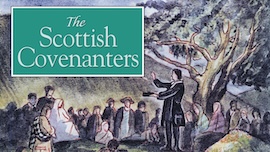John Livingstone's Most Productive Sermon Was Preached Despite Fear
NO DOUBT it was with some nervousness that John Livingstone preached his first sermon on this day, 2 January 1625, in his father’s pulpit at Kilsyth, Scotland. But his most famous sermon would come five years later.
Born a minister’s son in 1603, John Livingstone decided at a young age to follow Christ. He took delight in prayer and Bible study. Nonetheless, he was unsure of his salvation and trembled to think that he might be among the eternally damned.
He wanted to become a doctor, but his father vetoed the idea. John eventually decided to enter the ministry and attended the University of Glasgow. The year that he preached his first sermon was significant: it was the same year Charles I ascended the throne.
Charles harassed and persecuted Scots who did not accept his claim to be head of the church. Livingstone was among the persecuted and had to labor in Ireland because Scottish bishops considered him an enemy and would not assign him a position. However, friendly ministers would open their pulpits to him from time to time. For his part, he was determined to have Christ as his king and as Lord of the church, exclaiming, “Lord, forbid that [Christ] should be betrayed again in Scotland!”
His most famous sermon was preached on a Communion Monday in the kirk (church) at Shotts. Before the sermon he was so nervous he wanted to run and hide. Friends prayed for him. He overcame his fear and stayed to address a large audience. Such power from God accompanied his words that about five hundred people turned to Christ that day.
Livingstone thought that Scotland was distancing itself from Christ: “There are many betrayers of Christ amongst us, and some will not have a good minister when they can get him. Some think that Christ is going out of the land; but while He is as it were going out, He is looking back over His shoulder, saying, ‘Will ye let me go? Will ye let me go?’ But let it be your reply, ‘No, if we can hold or detain Thee.’”
During the English Civil War Livingstone sided with Cromwell and the Puritans against the Royalist party. When the Stuart dynasty was restored in the person of Charles II, son of Charles I, he refused to take a required oath of loyalty and was exiled. He settled in the Netherlands, dying in Rotterdam at the age of seventy-eight.
—Dan Graves
------- ------ ------
For more about the trials of the Scottish church, watch The Scottish Covenanters at RedeemTV.
The Scottish Covenanters can be purchased at Vision Video.







